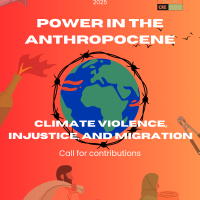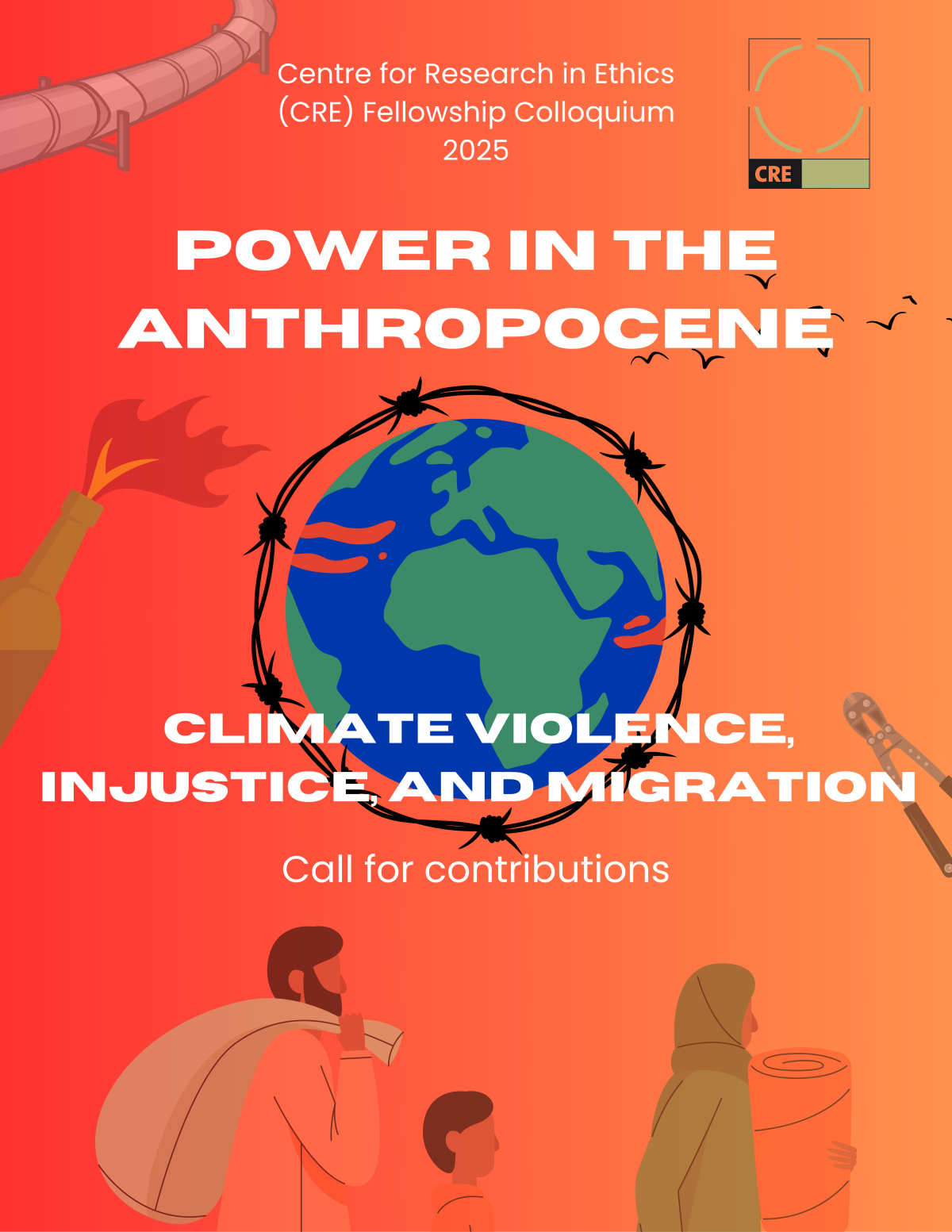
Call for Contributions – Power in the Anthropocene: Climate Violence, Injustice, and Migration
Centre for Research in Ethics (CRE) Graduate Fellows Conference 2025
Power in the Anthropocene: Climate Violence, Injustice, and Migration
May 15-16, 2025, in Montreal
Call for Contributions
Submission deadline: March 12, 2025

Ever since the rise of contemporary environmental movements and the publication of the first research on climate change and ecosystem degradation (Carson, 1962; Commoner, 1971; Dumont, 1973; Meadows et al., 1972; Schumacher, 1973), philosophy has attempted to conceptualize and problematize the genesis and consequences of these phenomena, and to reflect on possible ways to address them. More recently, the concept of the Anthropocene (Crutzen, 2002) and its many derivatives, such as Capitalocene and Plantationocene (Haraway, 2015), have been frequently adopted by social sciences to theorize the uniqueness of the present situation. An important link between many works mobilizing these concepts is the reflection on power. How does our mastery over nature define us as humans? How do different groups produce, prevent, endure, or resist change (and how should they do so)? It is in light of this last question that this conference will focus on the reexamination of fundamental ethical and political concepts occurring in the era of climate change and ecosystem degradation.
On the one hand, the differentiated responsibility and impacts of climate change have led to questions about the forms of harm and injustice that cause or result from these phenomena. To this end, the concepts of structural violence (Arenas-Garcia, 2024; Bonds, 2016), structural injustice (Eckersley, 2016; Heilinger and Kempt, 2020; Keij and van Meurs, 2023) and slow violence (Nixon, 2013) have been mobilized to characterize the evolution of social and political relations in the era of climate change (Boscov-Ellen, 2020; Cappelli, 2023). The concept of structural injustice, in particular, has been applied to the issue of climate migration (Dwyer, 2020), opening up new avenues for debates on borders, citizenship and migration. The study of migratory movements has moreover emerged as fertile ground for thinking about remedies that would restore a certain form of justice for those most affected by climate change, notably through the establishment of “mobility rights” (Marshall, 2015), “empowerment rights” (Drydyk, 2013) or even through the re-evaluation of our ethical and political frameworks of thought (Keyserlingk, 2018).
On the other hand, this concern has led to questions about the forms of action to be adopted to combat climate change and ways of adapting to its consequences in a context marked by the inertia of some of the most polluting states and companies. A multidisciplinary group of researchers have examined the forms of action that environmental movements can legitimately use to shake up the status quo. They have proposed, for example, to reinvest, and even go beyond, the concepts of civil disobedience (Garcia-Gibson, 2021; Welchman, 2001) and resistance (Caygill, 2019), notably by relating them to different forms of direct action (Kurtz, 2020; Parkin, 2020) and, more specifically, sabotage (Arridge, 2023; Malm, 2021; McLaughlin, 2023), and by questioning its relationship to violence (Anfinson, 2023). For their part, other researchers have focused on forms of action that can remedy both climate change and the harms and injustices associated with it (Akinsemolu and Olukoya, 2020; Boscov-Ellen, 2020; Cappelli, 2023).
The aim of this conference is to examine the contributions and limitations of ethical and political concepts in order to jointly reflect on the harm and injustice caused by climate change and ecosystem degradation, and the forms of action that can be taken to remedy them. More specifically, the aim is to explore the ways in which these concepts can, or fail to, address issues of violence, political action, immigration, colonialism, and international and intergenerational justice through the prism of ecological considerations.
Contributions offering insights into the following questions, as well as any other questions related to the above themes, are encouraged:
Violence and Climate Action
· What forms of action and conduct should we adopt to counter climate change and ecosystem degradation?
· Is resistance an appropriate term to describe and guide activist climate action?
· What place should escalation and diversity of tactics have in the environmental movement?
· What lessons should be learned from liberation movements, as well as from women’s and civil rights movements?
· Is material damage a morally and politically acceptable way to fight climate change?
· Should we go to war against the many forms of environmental degradation? What would that entail?
· Does the recent popular and governmental backlash to state measures like carbon, gas and car registration taxes alter the responsibility of concerned individuals to act by short-circuiting the usual democratic channels?
· How might we conceptualize state repression of environmental movements?
Environmental Injustices and Harms
· What kinds of harm and injustice are involved in climate change and ecosystem degradation?
· How can we establish compensation or reparations for these harms and injustices?
· Ten years after the emergence of Dixon’s (2013) concept of slow violence, are the phenomena that characterize the Anthropocene still pushing us to redefine and refine our conception of violence?
· Do the various concepts of injustice enable us to better reflect on the lived impacts of climate change, such as ecoanxiety and solastalgia?
· How should the burden of responsibility for climate change mitigation be distributed between individual, organizational and state actors?
· Given the differentiated contributions and impacts of multiple social groups to climate change, how can we conceptualize the social and political antagonisms that arise?
· How can classic issues in the ethics and politics of climate change, such as the problem of non-identity, be overcome with the help of recent theoretical developments?
Migration
· Should the prospect of a drastic increase in the number of climate migrants prompt us to rethink important concepts and policies related to migrants’ rights and citizenship?
· How should we think about moral and political responsibility towards climate migrants at a time when anti-immigration sentiments are on the rise?
· Should climate migrants have a right to return to their homelands? Will there be a responsibility, once climate change has been halted, to decarbonize the atmosphere to make territories that have had to be evacuated habitable again?
· Is it possible to effectively delineate the phenomenon of climate migration from other forms of migration?
· Beyond forms of compensation for losses, how can we restore agency to people displaced by environmental degradation?
To submit a proposal
Proposals for 25 minutes contributions must be submitted by email, in .pdf, .doc or .docx format, to cre.colloque2025@gmail.com by March 12, 2025 and meet the following conditions:
• Include a clear and evocative title
• Include an abstract of 300 words or less, clearly describing the central argument and relevance of your communication
• Include 2-5 keywords for your topic
• Be free of any information that could identify you
• File name following this structure : CRE2025_Title
Your email should contain your first and last name, as well as your institutional affiliation.
About the event
The Centre for Research in Ethics conference will take place in person in Montreal on May 15-16, 2025, and is open to communications in French and English. For any questions, do not hesitate to contact the organizing team at the address mentioned above.
References
Akinsemolu, A. A. et Olukoya, O. A. P. (2020). The vulnerability of women to climate change in coastal regions of Nigeria: A case of the Ilaje community in Ondo State. Journal of Cleaner Production, 246, 119015. https://doi.org/10.1016/j.jclepro.2019.119015
Anfinson, K. (2023). Climate Change and the New Politics of Violence. Dans Violence. Routledge.
Arenas-Garcia, N. (2024). Unpacking the Linkages between Structural Violence and the Climate Crisis. Environmental Ethics. https://doi.org/10.5840/enviroethics202491282
Arridge, A. S. (2023). Should We Blow Up a Pipeline? Environmental Ethics, 45(4), 403‑425. https://doi.org/10.5840/enviroethics202382863
Bonds, E. (2016). Upending climate violence research: Fossil fuel corporations and the structural violence of climate change. Human Ecology Review, 22(2), 3‑23. https://doi.org/10.3316/informit.324306883375423
Boscov-Ellen, D. (2020). A Responsibility to Revolt? Climate Ethics in the Real World. Environmental Values, 29(2), 153‑174. https://doi.org/10.3197/096327119X15579936382617
Cappelli, F. (2023). Investigating the origins of differentiated vulnerabilities to climate change through the lenses of the Capability Approach. Economia Politica, 40(3), 1051‑1074. https://doi.org/10.1007/s40888-023-00300-3
Carson, R. (1962). Silent Spring. Houghton Mifflin.
Caygill, H. (2019). Slow Violence and the Limits of Eco-resistance. Philosophical Journal of Conflict and Violence, 3(1), 1‑7.
Commoner, B. (1971). The Closing Circle : Nature, Man & Technology. Random House.
Crutzen, P. J. (2002). Geology of mankind. Nature, 415(6867), 23‑23. https://doi.org/10.1038/415023a
Drydyk, J. (2013). Development Ethics and the « Climate Migrants ». Ethics, Policy & Environment: A Journal of Philosophy and Geography, 16(1), 43‑55.
Dumont, R. (1973). L’Utopie ou la Mort. Seuil.
Dwyer, J. (2020). Environmental migrants, structural injustice, and moral responsibility. Bioethics, 34(6), 562‑569. https://doi.org/10.1111/bioe.12738
Eckersley, R. (2016). Responsibility for Climate Change as a Structural Injustice. Dans T. Gabrielson, C. Hall, J. M. Meyer et D. Schlosberg (dir.), The Oxford Handbook of Environmental Political Theory (p. 0). Oxford University Press. https://doi.org/10.1093/oxfordhb/9780199685271.013.37
Garcia-Gibson, F. (2021). Undemocratic Climate Protests. Journal of Applied Philosophy, 39(1), 162‑179. https://doi.org/10.1111/japp.12548
Haraway, D. (2015). Anthropocene, Capitalocene, Plantationocene, Chthulucene: Making Kin. Environmental Humanities, 6(1), 159‑165. https://doi.org/10.1215/22011919-3615934
Heilinger, J.-C. et Kempt, H. (2020). Loss and Damage, and Addressing Structural Injustice in the Climate Crisis. Ethics, Policy & Environment, 0(0), 1‑15. https://doi.org/10.1080/21550085.2024.2387999
Keij, D. et van Meurs, B. R. (2023). Responsibility for Future Climate Justice: The Direct Responsibility to Mitigate Structural Injustice for Future Generations. Journal of Applied Philosophy, 40(4), 642‑657. https://doi.org/10.1111/japp.12674
Keyserlingk, J. G. (2018). Immigration Control in a Warming World: Realizing the Moral Challenges of Climate Migration. Immigration Control in a Warming World: Realizing the Moral Challenges of Climate Migration. Imprint Academic. https://www.proquest.com/philosophersindex/docview/2159311298/18BBE97824854516PQ/2?sourcetype=Books
Kurtz, R. M. (2020). Direct Action and the Climate Crisis: Interventions to Resist and Reorganize the Metabolic Relations of Capitalism. Radical Philosophy Review, 23(2), 261‑297. https://doi.org/10.5840/radphilrev2020813114
Malm, A. (2021). How to Blow Up a Pipeline. Verso.
Marshall, N. (2015). Toward Special Mobility Rights for Climate Migrants. Environmental Ethics: An Interdisciplinary Journal Dedicated to the Philosophical Aspects of Environmental Problems, 37(3), 259‑276.
McLaughlin, A. (2023, 1 octobre). « Attacking the Things that Consume Our Planet »: Civil Disobedience, Direct Action and Climate Change [SSRN Scholarly Paper]. Social Science Research Network. https://doi.org/10.2139/ssrn.4589366
Meadows, D. H., Meadows, D. L., Randers, J. et Behrens III, W. W. (1972). The Limits to Growth. The Club of Rome.
Nixon, R. (2013). Slow Violence and the Environmentalism of the Poor. Harvard University Press.
Parkin, S. (2020). Resistance is fertile: Direct action vs. fossil fuels across North America. Dans Climate Justice and Community Renewal. Routledge.
Schumacher, E. F. (1973). Small is Beautiful : A Study of Economics As if People Mattered. Blond & Briggs.
Welchman, J. (2001). Is ecosabotage civil disobedience? Philosophy & Geography. https://doi.org/10.1080/10903770124815



